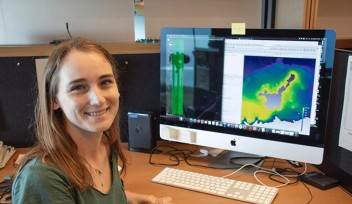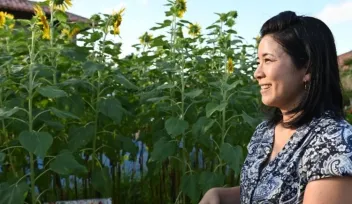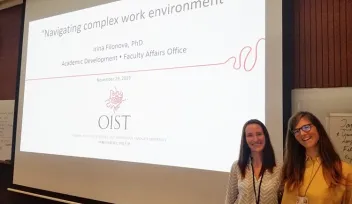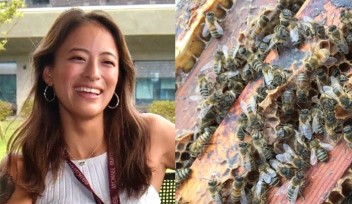Column: Accepting Ukrainian students and researchers
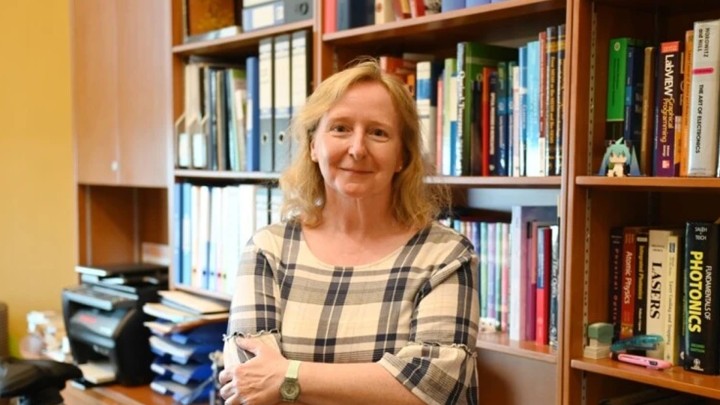
The latest OIST column in the Asahi Shimbun GLOBE+ is out now! OIST Media Relations Section Manager, Tomomi Okubo, spoke to Síle Nic Chormaic, OIST professor, about her initiative to receive students from Ukraine. The article is in Japanese, but the English translation can be read below.
Column Series "Scientists Without Borders in Churashima"
At the Okinawa Institute of Science and Technology Graduate University (OIST), which has surpassed the University of Tokyo in the percentage of high-quality papers ranking 9th in the world, exceptional scientists gather from around the world. This series of column "Scientists Without Borders in Churashima" will be published on an occasional basis to feature those scientists.
Accepting Ukrainian students and researchers
Professor Silé Nic Chormaic is a physicist who studies the interaction of light and matter in various systems. The term "system" here refers to the part of the nature that is the subject of examination. In Professor Nic Chormaic’s laboratory, researchers are looking at diverse systems, ranging from "cool atoms" and "whispering gallery mode microresonators" to nanoparticles, with the ultimate goal of improving quantum technology.
At Okinawa Institute of Science and Technology Graduate University (OIST), Professor Nic Chormaic not only conducts her research, but as a female faculty member, she also works hard to create a comfortable working environment for female researchers and to mentor her research unit members including students, interns, and post-doctoral researchers, who are so multinational and multicultural that she jokes about how it is like a "little United Nations."
On February 24 of this year, Ukraine crisis began with Russia’s invasion in the country. The following week, on March 4, all OIST staff and students received an e-mail from President Peter Gruss.
"Science is global, and in these times, standing together as one scientific community is more important than ever. As a proud member of our international community, I recognize our responsibility to support our diverse community members and partners around the world."
In the e-mail, President Gruss also stated that OIST would welcome scientists from Ukraine on a temporary basis and humanitarian grounds.
Upon reading this email, Professor Nic Chormaic immediately replied to President Gruss, "We can't just say something and not actually do it. If there is anything I can do as a faculty member to help the actual acceptance process, let me do that."
When asked why she decided to do that, Professor Nic Chormaic laughed and said, "I just did what feels natural to me. I was sitting in Europe at the time and the war felt very close. It was all everyone talked about. We needed to act."
Professor Nic Chormaic comes from Leixlip, Ireland, home of Guinness beer. Her father was a journalist and her mother was a play school teacher always active in "helping others," such as inviting teenage girls with unplanned pregnancies or women in abusive relationships into her home. Since her childhood, Professor Nic Chormaic has seen people giving opportunities for those in need in a natural way. Professor Nic Chormaic also grew up in an environment that gave her a global perspective, having two of her five brothers and sisters experiencing living in Africa.
Even before OIST decided to accept Ukrainian researchers and students for support, Professor Nic Chormaic had already made attempts to accept students who were not provided with the opportunities. When the Rita R. Colwell Impact Fund, established by the OIST Foundation in the United States, called for projects to support the advancement of female scientists, humanitarian aid was urgently needed in Afghanistan. Professor Nic Chormaic tried to accept female students from Afghanistan using this fund. However, after going through the process to accept two Afghan students, Professor Nic Chormaic had to give up the idea because of the strong social belief that is against women going abroad leaving their families behind and not being able to obtain their visas. Instead, she has been able to invite an intern student from Syria through this fund.
Once again, in accepting Ukrainian researchers and students, Professor Nic Chormaic faced an unexpected reality.
Many of the researchers who had been offered to come to OIST changed their minds and decided to stay in Ukraine to fight in the war against Russia or to serve as medical worker. Others declined the offer because they could not leave their fathers, brothers, or boyfriends behind. When her offer was declined for these reasons, Professor Nic Chormaic felt "extremely emotional and painful."
OIST also initiated the acceptance process for a male researcher living in Crimea. She then found out that people from Crimea, which was annexed by Russia, could not go abroad without having their visas issued by Russia. He has not been able to obtain visa and have lost contact with the organization. In addition, Professor Nic Chormaic found that there were even more barriers than originally imagined, such as the limited number of flights from Ukraine going over Russia to the east, where Japan is located, compared to the west, such as Europe. As a result, none of the researchers to whom OIST has made offers have not been able to make it to the university.
Meanwhile, as of June 14, 2022, OIST has accepted one student as an intern and is preparing for several more to come later.
"Many Ukrainians prefer Europe as a place to take refuge, and we realized that Japan, especially Okinawa, is too far away from them. The students we are accepting also might not wish to settle in Okinawa for a long term but just want to come as temporary shelter, so for the time being we will be accepting them as short-term interns."
The first student intern, who took refuge from Ukraine, joined Professor Nic Chormaic's research unit on June 7, 2022. The student happened to be in Poland on a short vacation just when the Russian invasion began and came to Okinawa without ever returning to her homeland.
As the intern had almost no luggage with herself, Professor Nic Chormaic made an arrangement to allow her to receive money to purchase what she needs in Okinawa. The intern can expect to receive gift certificates that Okinawa Prefecture offers to Ukrainian refugees, which will allow them to freely purchase daily necessities.
Fortunately, the student intern has quickly settled in after her arrival and is eager to begin her research.
Professor Nic Chormaic is currently preparing to accept two more students as interns as emergency support, while encouraging OIST to also accept as many students from Ukraine as possible for the regular internship positions available at the university.
Professor Nic Chormaic talked about a student in her laboratory who was a refugee from Africa during her doctoral course in France.
“At the time, refugees did not have access to education like the citizens. So, he attended a university many years after arriving in France. He never complained or talked about his background, but there was one time when he was the only one who could not get a visa to travel abroad to attend an academic conference. I remember feeling really frustrated from that."
Currently, Professor Nic Chormaic's research unit has interns from Russia, Ukraine, Malaysia, Greece, Uganda, Ecuador, Iraq and Syria doing research. Professor Nic Chormaic says that she accepted them because the quality of their education, research and motivation are high but she also tries to give researchers the opportunities as unbiased as possible.
“We at OIST have every opportunity to do research. But there are people in the world who do not have the same opportunities. It is only natural that I would do what I can do for those people."
---
Note: OIST accepts scientists (researchers and students) from Ukraine on a temporary basis for humanitarian reasons, using the Ukraine Scholar and Student Support Fund, which was jointly established by the OIST Foundation and OIST.
---
Síle Nic Chormaic
OIST Professor who leads the Light-Matter Interactions for Quantum Technologies Unit.
She was born in the city of Limerick, but grew up in Leixlip, a small town near Dublin, the capital of Ireland and graduated the National University of Ireland, Maynooth and received her PhD from Université Sorbonne Paris-Nord in France. After working in Austria, Australia, Germany, and Ireland she joined OIST in 2011. Her research unit currently has 9 staff researchers, 3 technical and other support staff, 7 PhD students, and 11 interns and visiting research students.
Written by Tomomi Okubo, OIST Media Relations Section










